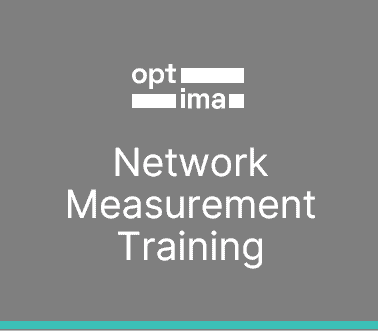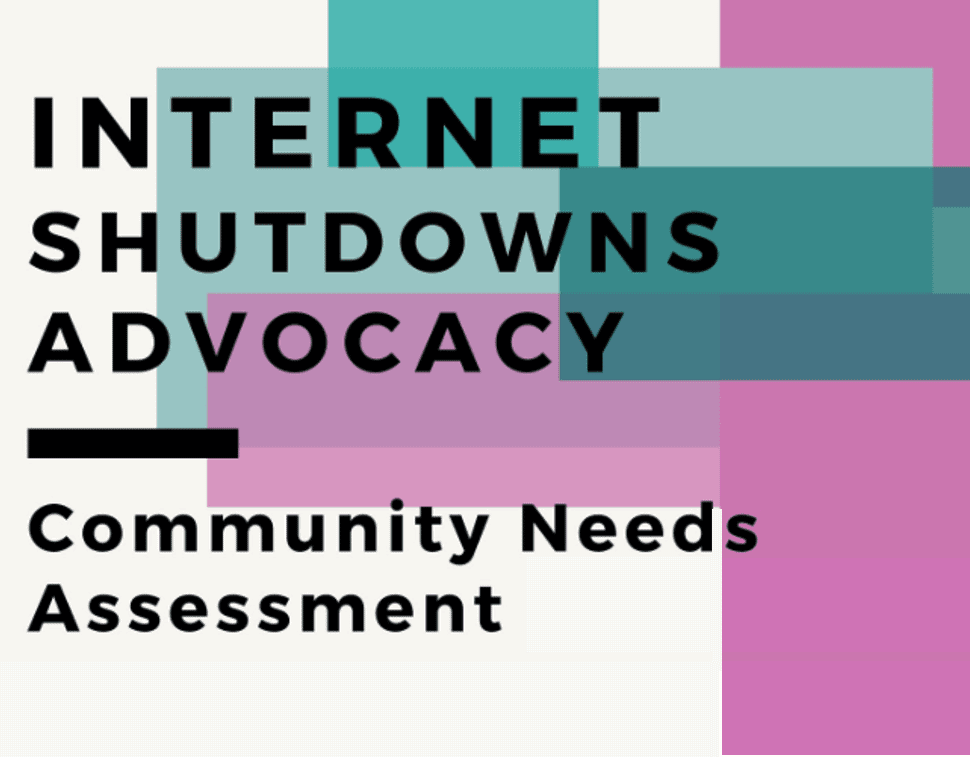
OPTIMA: Building Resources for Advocates to Better Predict, Prepare for, and Respond to Internet Shutdowns in Africa
THE CHALLENGE

Some governments treat the internet like a water tap- slowing access down to a drip or even turning it off entirely to prevent citizens from sharing information, silence citizens, stifle political opposition, and ultimately stay in power. States have a large arsenal of tools at their disposal to limit internet access; from blocking specific social media platforms, to shutting down broadband and mobile services, or even throttling (slowing) internet bandwidth so it can take an hour to upload a short video. While the reasons governments publicly give for these shutdowns may differ (fighting fake news! preventing cheating on exams! national security!), the message they send to their citizens is the same: we control you.
In Africa, governments’ use of shutdowns to stop citizens from voicing opposition and demanding accountability is alarming—according to AccessNow, in 2019 at least 14 countries instituted internet shutdowns at least 25 times (up 47% from 2018). Seven of these countries had never shut down the internet before or had not done so since before 2017.
THE ISSUES
How do you as an advocate, prepare for, or respond to, a shutdown in your country? This is a question that many people, especially activists new to internet freedom, are dealing with today. The problems they run into are vast:
- How do we know if an internet shutdown is about to happen in our country? How can we prepare civil society for an imminent internet shutdown?
- How do we hold policymakers and telcos accountable for an internet shutdown or slowdown? What messages can we use in our advocacy?
- Who can I reach out to in the international community to help us with the specific internet shutdown issues we’re facing in my country?
- Where are the resources that can help my community communicate during a shutdown?
- How have other countries dealt with shutdowns? Are there any solutions we can learn from?
There is a diverse international community of dedicated individuals and organizations monitoring, documenting, and advocating against internet shutdowns around the world. However, as internet shutdowns often occur with little notice, activists are forced to mobilize when capacity for communication and organization is most curtailed. Funding for internet shutdowns advocacy largely focuses on rapid-response efforts to end a shutdown, with few resources developed for local civil society to better prepare for a shutdown and build longer term advocacy strategies to prevent and protect against future shutdowns.
WHAT IS AN INTERNET SHUTDOWN?
nternet shutdowns are among the most extreme and draconian censorship tactics that governments use to control speech and stifle civic participation; shutdowns not only deny citizens their rights to expression and information, but also threaten health, safety, and economic security.
To learn more about detecting a shutdown, read more about network measurement and how OPTIMA is using detection to help advocates prepare for, respond to, and prevent shutdowns across Africa.
OUR RESPONSE

OPTIMA was designed with these challenges in mind. Through research, training, investment, and network-building activities, we work with a community of organizations addressing shutdowns, to map existing resources, identify gaps, and fund resources that are most needed, in order to help create more sustainable resources for the IF community to support systematic responses.
- Understanding the threat: In order to develop strategic responses, Internews conducted a needs assessment and identified the challenges faced by advocacy communities fighting internet shutdowns in countries around the world;
- Equipping front line defenders: Internews is partnering with leading digital rights groups in Cameroon and Tanzania to develop and deploy best practices and strategic approached to internet shutdown advocacy.
- Upskilling the response: Adding empirical evidence to traditional campaigns equips activists with a critical set of tools for informed campaigns and outreach. We have developed technical trainings for advocates to document network disruptions.
Before designing solutions, Internews sought to first gain a clearer picture of who exists within the internet shutdown advocacy community, what roles those actors play, and what specific needs exist to more effectively respond to the threat. To this end, we developed a needs assessment to share broadly within the community, asking a diverse range of organizations and individuals from civil society, the private sector, and academia, to think about their role in responding to shutdowns, and what they saw as the most pressing needs moving forward. Below you will find a snapshot of the findings, and you can explore the full results in the OPTIMA needs assessment report here.
What we have learned
OPTIMA’s Internet Shutdowns Advocacy Needs Assessment surveyed 142 civil society organizations to understand the most pressing challenges civil society organizations face in fighting to prevent and curtail internet shutdowns, the resource and skill gaps they feel they need to fill to be more effective in this advocacy, and the opportunities for support from funders and global advocacy groups. As part of this research, we found:
The threat is high
— 60% of respondents in our research survey said a shutdown in the next year is likely or very likely
But capacity is low
— 49% of the respondents assessed capacity as either nonexistent or weak
— 84% of respondents that have never worked on shutdowns report that they do not have any preparatory measures in place in case of an internet shutdown.
Using our findings to drive programming
Resource creation & localization:
Through small granting, we produce advocacy resources and Circumvention tool guides. To see these resources, check out the Workflow (below) or the resources page.
Training & expert coordination:
We conduct trainings on network measurement to upskill advocates with quantitative methods.
Workflow:
We built a curated collection of resources to help activists easily find information to respond to Internet shutdowns. The “Prepare, Prevent, Predict” Workflow includes advocacy best practices, case studies, methods for network measurement, tutorials and resources to improve technical capacity. Check out the Workflow here!


LEARN MORE ABOUT NETWORK MEASUREMENT
The six modules below were originally designed as a part of a live guided training on Network Measurement for advocates. The course, and the core videos below, provide a primer on how use three leading network measurement tools developed by OONI, M-Lab, and IODA respectively. To learn more about the training, click here. To take part in a future training and work directly with members of each tool team, reach out to us as [email protected].
MODULE 1: INTRODUCTION TO NETWORK MEASUREMENT
This session provides an overview to Internet measurement, with a focus on the tools, projects and datasets that can be used to uncover evidence of information controls. We examine some of the common questions that researchers and advocates may have that can be answered through network measurements, what limitations each dataset can have and the different methods. The primer also presents the risks inherent in conducting internet measurement research within restrictive contexts.
Lecturer: Maria Xynou, Open Observatory of Network Interference (OONI)
Watch the recorded session on our YouTube channel here.
MODULE 2: DOCUMENTING BLACKOUTS
This session serves as a primer on how to use the Internet Observatry for Data Analystcs (IODA)’s tools to detect when mobile and/or fixed internet access has been cut off at the national or subnational level
Lecturer: Rama , Center for Applied Internet Data Analysis at the Univeristy of California San Diego
Watch the recorded session on our YouTube channel here
MODULE 3: DETECTING BLOCKING OF WEBSITES AND APPLICATIONS
This session serves as a primer on how to use OONI’s tools to detect the blocking of websites, instant messaging apps, and censorship circumvention tools. This session also discusses how you can use OONI network measurement data to uncover evidence of internet censorship.
Lecturer: Maria Xynou, Open Observatory of Network Interference (OONI)
Watch the recorded session on our YouTube channel here.
MODULE 4: MEASURING INTERNET PERFORMANCE
This session explores how to measure internet performance, speeds, and provides a discussion on how governments are able to “throttle” internet speeds and some of the challenges with measuring throttling
Lecturer: Lai Yi Ohlsen and Chris Ritzo, Measurement Lab (M-Lab)
Watch the recorded session on our YouTube channel here.
MODULE 5: CONTEXTUALIZING YOUR DATA: USING LOCAL INSIGHTS AND QUALITATIVE RESEARCH
This session explores how various research methods can be used to contextualize technical data in order to verify analysis and better understand user impact and experience. The session provides an overview on other methods that are useful to supplement technical measurement as well as case studies that draw on mixed-methods to document network interference.
Lecturer: Chinmayi SK, Bachchao Project
Watch the recorded session on our YouTube channel here.
MODULE 6: USING MEASUREMENT IN ADVOCACY
This session offers best practices in using measurement research within advocacy campaigns related to internet disruptions and access. It highlights the use cases for quantitative measurement data, and how they are critical to advocacy efforts globally.
Lecturer: Berhan Taye, Access Now
Watch the recorded session on our YouTube channel here.


